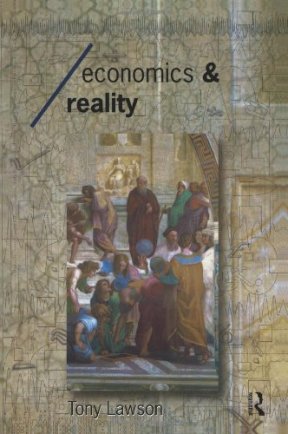Modern economics has become increasingly irrelevant to the understanding of the real world. In his seminal book Economics and Reality (1997) Tony Lawson traced this irrelevance to the failure of economists to match their deductive-axiomatic methods with their subject. It is — sad to say — as relevant today as it was twenty years ago. It is still a fact that within mainstream economics internal validity is what really counts and external validity is only rarely discussed. Why anyone should be interested in that kind of theories and models is beyond imagination. As long as mainstream economists do not come up with any export-licenses for their theories and models to the real world in which we live, they really should not be surprised if people say that this is not science,
Topics:
Lars Pålsson Syll considers the following as important: Economics
This could be interesting, too:
Lars Pålsson Syll writes Schuldenbremse bye bye
Lars Pålsson Syll writes What’s wrong with economics — a primer
Lars Pålsson Syll writes Krigskeynesianismens återkomst
Lars Pålsson Syll writes Finding Eigenvalues and Eigenvectors (student stuff)
 Modern economics has become increasingly irrelevant to the understanding of the real world. In his seminal book Economics and Reality (1997) Tony Lawson traced this irrelevance to the failure of economists to match their deductive-axiomatic methods with their subject.
Modern economics has become increasingly irrelevant to the understanding of the real world. In his seminal book Economics and Reality (1997) Tony Lawson traced this irrelevance to the failure of economists to match their deductive-axiomatic methods with their subject.
It is — sad to say — as relevant today as it was twenty years ago.
It is still a fact that within mainstream economics internal validity is what really counts and external validity is only rarely discussed. Why anyone should be interested in that kind of theories and models is beyond imagination. As long as mainstream economists do not come up with any export-licenses for their theories and models to the real world in which we live, they really should not be surprised if people say that this is not science, but autism!
Using mathematics and logic is interesting and fun. It sharpens the mind. In pure mathematics and logic, we do not have to worry about external validity. But economics is not pure mathematics or logic. It’s about society. The real world. Forgetting that, economics becomes irrelevant pseudo-science.
Economics, it might be argued, has gotten this backwards. We have imposed our pre-conceived methods on economic reality in such manner as to distort our understanding of it. We start from optimal choice and fashion an image of reality to fit it. We transmit this distorted picture of what the world is like to our students by insisting that they learn to perceive the subject matter trough the lenses of our method.
The central message of Lawson’s critique of modern economics is that an economy is an “open system” but economists insist on dealing with it as if it were “closed.” Controlled experiments in the natural sciences create closure and in so doing make possible the unambiguous association of “cause” and “effects”. Macroeconomists, in particular, never have the privilege of dealing with systems that are closed in this controlled experiment sense.
Our mathematical representations of both individual and system behaviour require the assumption of closure for the models to have determinate solutions. Lawson, consequently, is critical of mathematical economics and, more generally, of the role of deductivism in our field. Even those of us untutored in ontology may reflect that it is not necessarily a reasonable ambition to try to deduce the properties of very large complex systems from a small set of axioms. Our axioms are, after all, a good deal shakier than Euclid’s.
Economics and Reality was a great inspiration to me twenty years ago. It still is.
